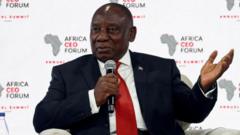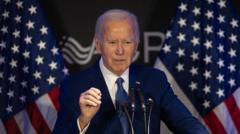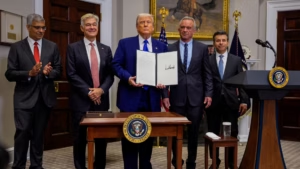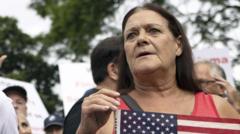While President Trump has granted refugee status to Afrikaners in the U.S., claiming they are victims of genocide in South Africa, the reality of their situation remains complex. Political parties and experts in South Africa have largely dismissed claims of widespread violence against this group as exaggerated or unfounded, highlighting the importance of understanding historical and social dynamics before drawing conclusions.
Analyzing Claims of Genocide Against Afrikaners in South Africa Amid U.S. Political Discourse

Analyzing Claims of Genocide Against Afrikaners in South Africa Amid U.S. Political Discourse
U.S. President Donald Trump's allegations of genocide against South African Afrikaners have sparked a contentious debate over racial tensions and historical context in the country.
In recent remarks, U.S. President Donald Trump has accused South Africa of committing genocide against its Afrikaner population, a claim that has generated considerable debate and concern. The assertion comes alongside the U.S. granting refugee status to nearly 60 Afrikaners, who have since arrived in America. Their departure and the U.S. embassy's unusual facilitation for refugee applications have sparked skepticism, raising questions about the context of their asylum.
The Afrikaners are a cultural group with roots tracing back to 17th-century European settlers in South Africa, identifying closely with their land and culture. This demographic constitutes approximately 4% of South Africa's over 60 million citizens. Historically, Afrikaners were at the forefront of the imposition of apartheid, which enforced severe racial segregation until its dismantle in 1994. The phrase "Boer" means farmer, reflecting their connection to agriculture, yet their history cannot be disentangled from the oppression of the majority black population.
Despite claims of genocide proliferating among some right-wing circles and echoed by Trump, none of South Africa's political factions, including those representing white South Africans, have officially supported such claims. This notion gained traction from violent incidents targeting white farmers, yet analysis by South African authorities has labeled this narrative as "clearly imagined." A ruling in a 2024 court case affirmed the absence of any evidence of genocide in the country.
Trump, while defending his actions regarding Afrikaners, remarked on the supposed brutal violence against white farmers, questioning how the U.S. could participate in international meetings in South Africa under such conditions. South African President Cyril Ramaphosa strongly rebuffed Trump's allegations, distancing the claims from reality and attributing the departures of some Afrikaners to their unwillingness to accept societal changes post-apartheid.
Moreover, the notion of land confiscation has been a contentious topic. South Africa's current legislation seeks to address land disparities created during apartheid without expressly targeting Afrikaners. While some legacy issues remain unresolved, opposition parties have raised concerns about proposed laws affecting property rights, contributing to the complex socio-political climate.
Elon Musk, a close advisor to Trump and a South African native, also weighed in on the subject, criticizing ownership laws that he perceives as discriminatory. His comments have further stoked the flames of racial discourse in South Africa, particularly surrounding the contentious songs performed by the leftist Economic Freedom Fighters party, associated with calls to action against Afrikaners by some critics.
Yet, in a broader context, approximately 70,000 Afrikaners have reportedly expressed interest in emigrating to the U.S. following Trump's offer. Nonetheless, many prominent Afrikaner groups have publicly opposed the idea of leaving South Africa, advocating for a commitment to address challenges locally. According to them, an exodus would not be the solution to longstanding ethnic and economic issues.
In conclusion, the dialogue surrounding claims of genocide against Afrikaners, while amplified by political figures in the U.S., overlooks a multifaceted historical and social landscape that complicates such narratives. As discussions about race and land ownership continue to unfold, it remains crucial to navigate these topics with a nuanced understanding of their implications for all South Africans.
The Afrikaners are a cultural group with roots tracing back to 17th-century European settlers in South Africa, identifying closely with their land and culture. This demographic constitutes approximately 4% of South Africa's over 60 million citizens. Historically, Afrikaners were at the forefront of the imposition of apartheid, which enforced severe racial segregation until its dismantle in 1994. The phrase "Boer" means farmer, reflecting their connection to agriculture, yet their history cannot be disentangled from the oppression of the majority black population.
Despite claims of genocide proliferating among some right-wing circles and echoed by Trump, none of South Africa's political factions, including those representing white South Africans, have officially supported such claims. This notion gained traction from violent incidents targeting white farmers, yet analysis by South African authorities has labeled this narrative as "clearly imagined." A ruling in a 2024 court case affirmed the absence of any evidence of genocide in the country.
Trump, while defending his actions regarding Afrikaners, remarked on the supposed brutal violence against white farmers, questioning how the U.S. could participate in international meetings in South Africa under such conditions. South African President Cyril Ramaphosa strongly rebuffed Trump's allegations, distancing the claims from reality and attributing the departures of some Afrikaners to their unwillingness to accept societal changes post-apartheid.
Moreover, the notion of land confiscation has been a contentious topic. South Africa's current legislation seeks to address land disparities created during apartheid without expressly targeting Afrikaners. While some legacy issues remain unresolved, opposition parties have raised concerns about proposed laws affecting property rights, contributing to the complex socio-political climate.
Elon Musk, a close advisor to Trump and a South African native, also weighed in on the subject, criticizing ownership laws that he perceives as discriminatory. His comments have further stoked the flames of racial discourse in South Africa, particularly surrounding the contentious songs performed by the leftist Economic Freedom Fighters party, associated with calls to action against Afrikaners by some critics.
Yet, in a broader context, approximately 70,000 Afrikaners have reportedly expressed interest in emigrating to the U.S. following Trump's offer. Nonetheless, many prominent Afrikaner groups have publicly opposed the idea of leaving South Africa, advocating for a commitment to address challenges locally. According to them, an exodus would not be the solution to longstanding ethnic and economic issues.
In conclusion, the dialogue surrounding claims of genocide against Afrikaners, while amplified by political figures in the U.S., overlooks a multifaceted historical and social landscape that complicates such narratives. As discussions about race and land ownership continue to unfold, it remains crucial to navigate these topics with a nuanced understanding of their implications for all South Africans.






















